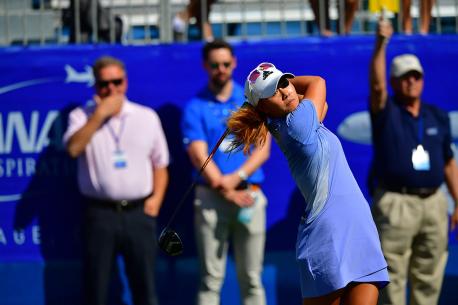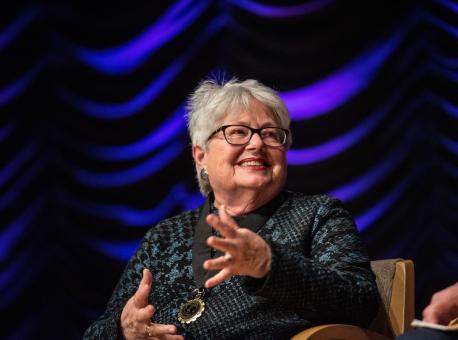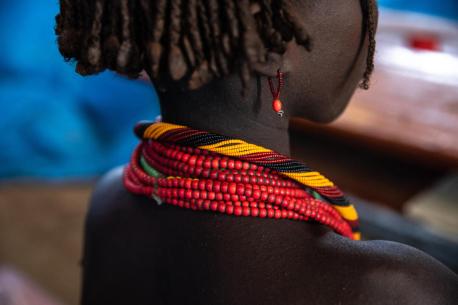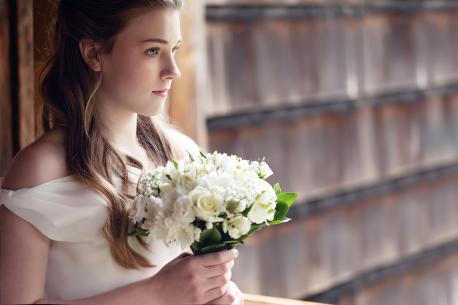
LPGA Star Danielle Kang Launches New UNICEF Campaign
LPGA star Danielle Kang partners with UNICEF for the Birdies to Build Better Futures campaign. Read more and join the campaign.
It was a dream come true for pro golfer Danielle Kang to sink four birdies in a row under back nine pressure to win the 2017 KMPG PGA Championship, her first major title.
These days Kang is celebrating the official kick off of another one of her childhood aspirations: a partnership with UNICEF.
On the heels of an eye-opening trip to the Dominican Republic with UNICEF NextGen, Kang is bringing her star power and passion for children's issues to a new campaign, Danielle Kang Birdies to Build Better Futures. For the duration of the campaign, Kang is inviting supporters to join her in pledging a donation to UNICEF for every birdie — one stroke under par — that she sinks during select tournaments this LPGA season.
“When fans see me make a birdie, I want them to be reminded that there's an organization called UNICEF that's helping children," Kang says. "And I want them to be inspired to help too."
When fans see me make a birdie, I want them to be reminded that there's an organization called UNICEF that's helping children — and I want them to be inspired to help too.
UNICEF USA caught up with Kang to learn more about her interest in humanitarian work, and what she learned during her time in the field. (The conversation has been edited for length and clarity.)
Why did you start working with UNICEF?
DANIELLE KANG I've had a strong conviction since I was young that I wanted to help make a difference. I've been very blessed and fortunate, and I want to give back, help make things easier for other people, if I can. I've known about UNICEF my whole life, and have always admired how the organization approaches its mission for children, how it invests in taking care of the whole person — providing food, shelter, medical care — and protecting human rights, children's rights.
How have your parents influenced you?
DANIELLE KANG My parents were always very generous, very giving, and so that was how I was raised: to give to others. My mom always says, 'I don't care how great of a golfer you are, you first have to be a great person.' My Dad passed away a few years ago, but for the 20 years that I had him in my life, I learned so much. He had a big heart. When I was a kid he would take me with him to buy a bunch of hamburgers and then we would hand them out to homeless people. That experience really stuck with me.
You were recently in the Dominican Republic for a firsthand look at UNICEF 's work and impact. What did you learn?
DANIELLE KANG I learned about how UNICEF works with the government to make change. In DR, they're working with the government on child protection, to prevent violence, sexual abuse and exploitation. UNICEF shows what is possible on the ground, through its programs, and then the government will act to bring about bigger change, by passing new laws or adopting new policies. You think UNICEF is about helping this child or this family, or building another child or community center where people can go to get services, but it's bigger and broader than that. It's about changing systems.
What were some of the most memorable moments?
DANIELLE KANG We visited a young mother at her home, in a neighborhood where there were signs of poverty all around. This mom was so welcoming, and so kind. She told us about going to UNICEF's ECD [Early Childhood Development] center every 15 days, that she brings her two young children with her, where there are activities designed to stimulate their young brains. There are breastfeeding and other classes for the moms too. She just wanted the best for her baby, and was happy her baby was healthy.
Where else did you go during the field visit?
DANIELLE KANG We visited a high school where they are working on reducing violence. The kids were getting into fights, fistfights, and other nonsense. Teachers would beat up students. So they became part of this UNICEF program that teaches mediation methods to prevent violence in schools. It was working so well that the government responded [by implementing the program more broadly].
We also went to a hospital where we met a group of young pregnant women. There was a 13-year-old who was pregnant, girls 15, 16 and 17 who were pregnant. They didn't know that sex can lead to pregnancy, that it can cause HIV. There is no sex education in the Dominican Republic, it's off limits because it goes against the church. I also didn't know that child marriage still existed.
I didn't know that child marriage still existed.
What was that like, interacting with these kids, learning about their lives?
DANIELLE KANG We sat with a group of teenagers, girls and boys, and they were speaking passionately about wanting change in their country, about needing change. They were frustrated. They were like, help us. Help us make change. It made me glad that I am part of something working toward that change.
Spending time with these kids, I also realized something else: that even though our lives are different, we still have a lot in common. We all want to be happy, we all want love, we all like to spend time with our friends. One of the girls had posted a photo of another girl's boyfriend, and the other girl got upset. The same stuff happens here in the U.S. (laughs).
Pro golfer Danielle Kang traveled to the Dominican Republic with UNICEF NextGen in February 2019, where she had a chance to meet young moms and their children, and learn more about the benefits and impact of UNICEF's Early Childhood Development programs. © Danielle Kang
What do you hope to accomplish through your Birdie Campaign, launching on International Women's Day [March 8]?
DANIELLE KANGI hope to influence millennials to care about others. This culture has become so self-centered. Too many people think it's all about getting the best of everything. I went to a UNICEF USA gala in San Francisco, and I loved listening to people who work with UNICEF talk about what they had seen, and what they had done and what they are willing to do to make a difference. I hope this Birdie campaign can show people that we can all make a difference. Everybody can. You don't have to have a lot of money because it's not how much money you give, it's the passion that counts.
Photo at top: Professional golfer Danielle Kang says her parents taught her determination, focus and the importance of giving back to others. © Gabe Roux
HOW TO HELP
There are many ways to make a difference
War, famine, poverty, natural disasters — threats to the world's children keep coming. But UNICEF won't stop working to keep children healthy and safe.
UNICEF works in over 190 countries and territories — more places than any other children's organization. UNICEF has the world's largest humanitarian warehouse and, when disaster strikes, can get supplies almost anywhere within 72 hours. Constantly innovating, always advocating for a better world for children, UNICEF works to ensure that every child can grow up healthy, educated, protected and respected.
Would you like to help give all children the opportunity to reach their full potential? There are many ways to get involved.





